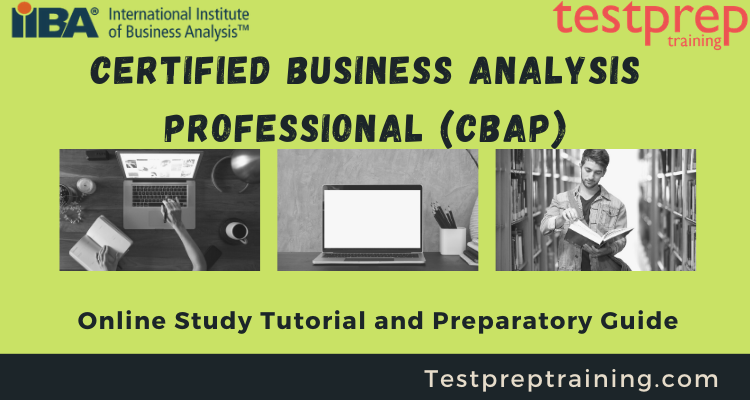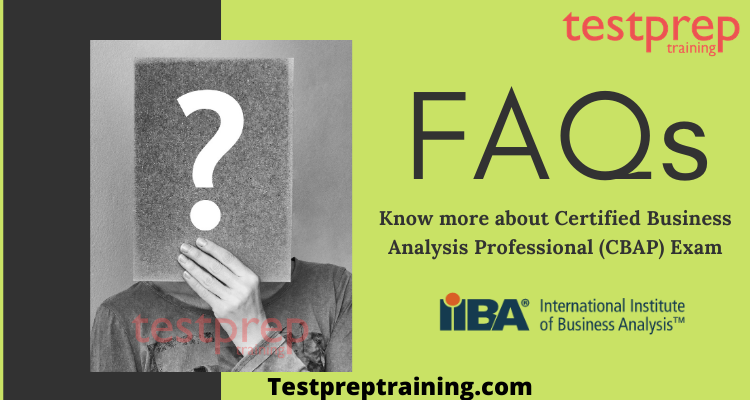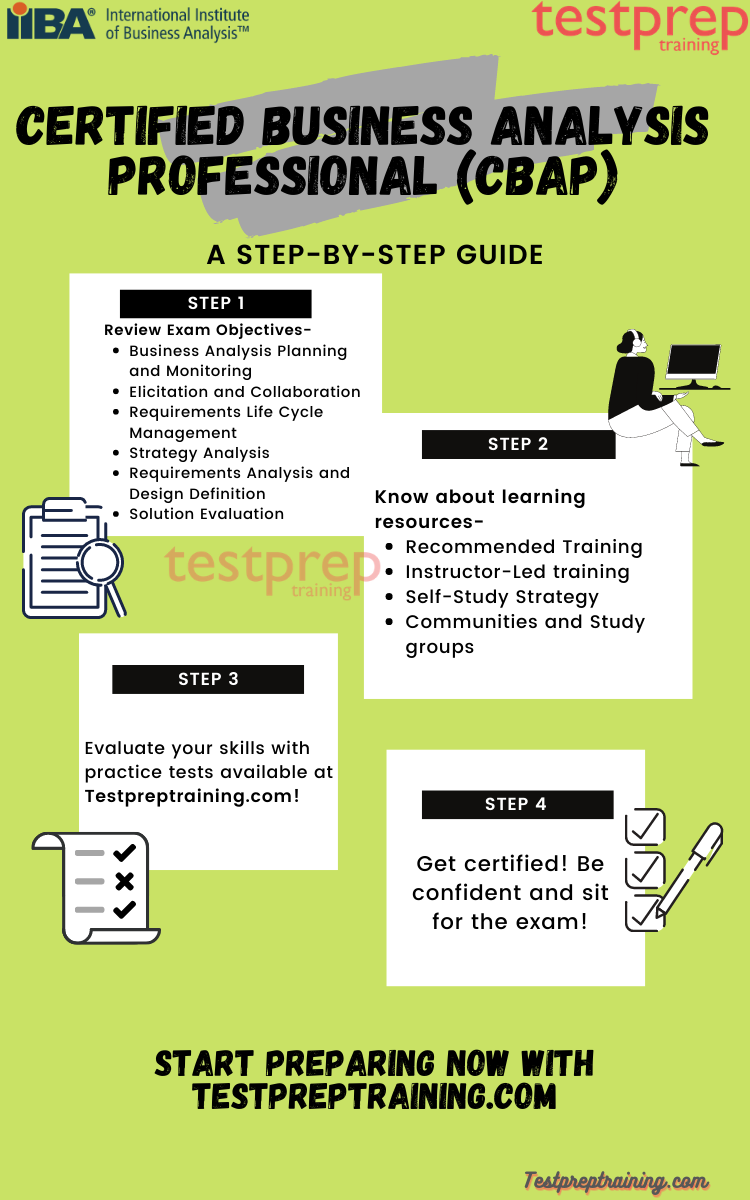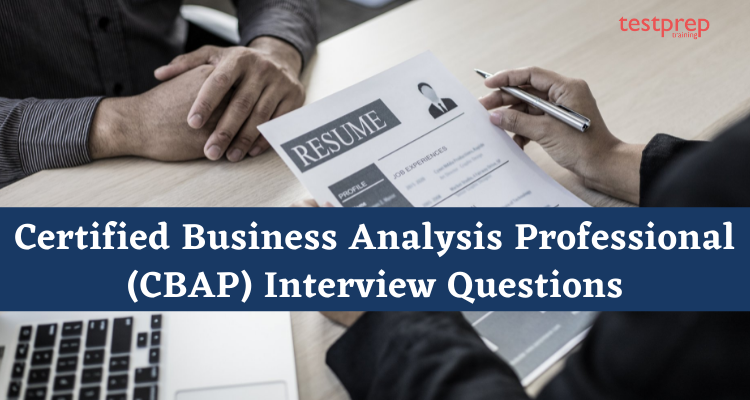Certified Business Analysis Professional (CBAP)

Certified Business Analysis Professional (CBAP ) is suitable for professionals with extensive business analysis (BA) experience. This certification helps you to showcase your skills in front of your superiors and get hikes in your career. It enhances your professional credibility and enhances your skills and knowledge. You have to pay full dedication and do a lot of hard work in order to crack this exam. Let us dig deeper into the details of the exam.
About Certified Business Analysis Professional™ (CBAP®) Certification Exam
Certified Business Analysis Professional (CBAP) is suitable for professionals with extensive business analysis (BA) experience. CBAP ® recipients are the leading, senior members of the BA community. A variety of benefits are offered to members of the BA community by The Certified Business Analysis Professional™ (CBAP), including:
- Demonstrated senior knowledge and professional competence
- Marketability, employability and earning potential
- Success and path to leadership
Your expertise in multiple business domains is recognized by CBAP and your ability to tackle more complex projects, work with stakeholders to define and manage their business requirements, lead the BA effort, drive business processes, and identify opportunities to achieve better business results.
Eligibility for Certified Business Analysis Professional™ (CBAP®)
To earn the CBAP designation, candidates must:
- In the last 10 years complete a minimum of 7,500 hours of Business Analysis Work Experience.
- A minimum of 900 hours completed in 4 of the 6 BABOK® Guide Knowledge Areas, within this experience, for a total of at least 3,600 of the required 7,500 total.
- In the last 4 years complete a minimum of 35 hours of Professional Development.
Who should take CBAP Exam?
CBAP exam is suitable for –
- Individuals with significant experience in business analysis
- Individuals with a CBAP™ designation
- Product Managers
- Non-BA consultants
- Trainers
- Hybrid Business Analysis professionals, including: Project Manager, Testers, Quality Assurance (QA) professionals, Change/Transformation Managers, and Designers
Exam Format
| Exam Name Certified Business Analysis Professional | Exam Code CBAP |
| Exam Duration 3.5 hours | Exam Format Multiple Choice and Multi-Response Questions |
| Certifying Body IIBA | Number of Questions 120 Questions |
| Eligibility/Pre-Requisite As specified* | Passing Rate 70% |
| Exam Language English | Renewal Not Required |
Cancellation and reschedule Policy
You will have 12 months from the day IIBA received your exam or exam rewrite fee to request a refund.
- After such time, your exam or exam rewrite fee payment will become non-refundable and you will forfeit your payment. This means that to schedule and sit the exam, you will need to repay the exam or exam rewrite fee.
Refund process within the 12 months eligibility period:
- To receive a refund of the exam or exam rewrite fee payment, you must first cancel your scheduled exam, and then e-mail the refund request to [email protected].
If you miss your scheduled exam date without cancelling or rescheduling in advance, you will be considered a no-show. This means you will have to forfeit your exam fee or exam rewrite fee already paid (unless there is an extenuating circumstance) and, will have to repay the exam fee or exam rewrite fee to schedule and sit the exam.
To cancel or reschedule your exam, login with your IIBA credentials and select Certification > My Certifications. Click the Schedule and Pass Exam button. This will take you automatically to the PSI exam scheduling page.
You can then select the Cancel Schedule or Reschedule button.
Special Accommodation Policy
A modification to the exam procedure may be requested due to disability, handicap, or other condition that may affect the ability to sit for the exam. Special exam accommodation requests should be reasonable and not compromise the validity and reliability of the exam.
If you require special accommodations to take the exam, do not schedule your exam. You will be required to provide a note from a doctor or health care professional (i.e. no x-rays, lab or test results should be provided). Do not email IIBA your note. Instead, please add your note to either Google Drive, icloud or a dropbox and email a link to it with your request. If your request involves rescheduling or cancelling an exam, please include the exam date and your desired exam date in your email. Please send your email to [email protected]. This note should support the need for your special accommodation and include:
- The diagnosis of your health condition or disability that significantly impairs your ability to arrive at, read or write the exam, or any other related skills required to complete the examination
- The specific recommendation for your special accommodation(s)
Once your request has been approved, you will receive an email from IIBA on next steps to follow to schedule your exam.
Certified Business Analysis Professional (CBAP) FAQs
It is very important to know in details about the exam. You can collect all the details by visiting the official site of the exam or, to know more from us, visit – Certified Business Analysis Professional (CBAP) FAQs

Course Details
The CBAP certification examination is based on Business analysis body of knowledge (BABOK) guide. The BABOK guide is structured into knowledge areas, Techniques, perspectives and competencies. You can access BABOK V3 revision guide here.
For the CBAP exam structure, the weightage of the knowledge areas is provided below:
| Knowledge Area | CBAP |
| Business Analysis Planning and Monitoring | 14% |
| Elicitation and Collaboration | 12% |
| Requirements Life Cycle Management | 15% |
| Strategy Analysis | 15% |
| Requirements Analysis and Design Definition | 30% |
| Solution Evaluation | 14% |
Business Analysis Planning and Monitoring
Plan Business Analysis Approach
- Creates rules for selecting the business analysis approach.
- Guides practice in determining the level of business analysis formality.
- Creates rules for identifying business analysis activities.
- Advanced knowledge of the timing of business analysis work.
- Advanced knowledge of assessing complexity, size, and risk factors.
- Guides practice in gaining stakeholder understanding and agreement.
Plan Stakeholder Engagement
- Guides practice in performing stakeholder analysis.
- Advanced knowledge of defining the required level of stakeholder collaboration.
- Advanced knowledge in identifying appropriate stakeholder communication needs.
Plan Business Analysis Governance
- Advanced knowledge in identifying an effective decision-making process.
- Guides practice in developing effective change control processes.
- Guides practice in planning an effective prioritization process.
- Advanced knowledge of planning an effective approval process.
Plan Business Analysis Information Management
- Guides practice in determining how to organize business analysis information.
- Guides practice in determining the appropriate level of abstraction.
- Creates rules on planning the traceability approach.
- Creates rules on planning for requirements reuse.
- Guides practice in determining how to store and access business analysis information.
- Creates rules for identifying attributes for requirements and design management.
Identify Business Analysis Performance Improvements
- Advanced knowledge of reporting on business analysis performance.
- Advanced knowledge of identifying business analysis performance measures.
- Guides practice in assessing business analysis performance measures.
- Guides practice in recommending business analysis performance improvements.
Elicitation and Collaboration
Prepare for Elicitation
- Modifies rules for the elicitation scope
- Modifies rules for selecting appropriate elicitation techniques
- Modifies rules for setting up logistics for elicitation activities
- Modifies rules for preparing supporting elicitation materials
- Recommends action on stakeholder preparation for elicitation activities
Conduct Elicitation
- Creates rules for guiding the elicitation activity
- Creates rules for capturing the outcomes of the elicitation activity.
Confirm Elicitation Results
- Advanced knowledge in comparing elicitation results against source information.
- Advanced knowledge comparing elicitation results against other elicitation results.
Communicate Business Analysis Information
- Advanced knowledge in determining objectives and format of communication.
- Guides practice in communicating the appropriate level of detail.
Manage Stakeholder Collaboration
- Advanced knowledge of gaining agreement for required stakeholder commitments.
- Advanced knowledge of monitoring stakeholder engagement.
- Advanced knowledge of collaborative stakeholder relationships.
Requirements Life Cycle Management
Trace Requirements
- Creates rules for considering value and relationships while tracing requirements
- Creates rules for identifying the relationships to track to effectively manage traceability
- Creates rules for determining an appropriate traceability repository to be used.
Maintain Requirements
- Guides practice in maintaining requirements and design information.
- Guides practice in managing attributes.
- Guides practice in managing requirements for long-term reuse.
Prioritize Requirements
- Guides practice in determining the appropriate basis for prioritizing requirements.
- Guides practice in guiding stakeholders through prioritization changes.
- Advanced knowledge of prioritizing new information.
Assess Requirements Changes
- Advanced knowledge of assessing the formality of the assessment process.
- Advanced knowledge of completing impact analysis activities.
- Advanced knowledge of guiding impact resolution activities.
Approve Requirements
- Advanced knowledge of stakeholder roles and authority levels.
- Guides practice in managing conflicts and resolving issues.
- Advanced knowledge of using appropriate methods to gain consensus about key business analysis information.
- Guides practice in tracking and communicating approval decisions.
Strategy Analysis
Analyze Current State
- Guides practice in defining business needs.
- Guides practice in understanding the organizational structure and culture.
- Guides practice in understanding the organizational capabilities and processes.
- Guides practice in understanding the technology and infrastructure utilized by the organization.
- Guides practice in understanding organizational policies and business rules.
- Guides practice in understanding the organization’s business architecture.
- Guides practice in understanding the organization’s internal assets
- Guides practice in understanding external influencers.
Define Future State
- Guides practice in articulating business goals and objectives.
- Guides practice in determining the solution scope.
- Guides practice in identifying constraints.
- Advanced knowledge in identifying potential changes to organizational structure and culture.
- Advanced knowledge in identifying new capabilities and business processes.
- Advanced knoledge in identifying new technology and infrastructure.
- Guides practice in identifying new organizational policies and business rules.
- Guides practice in ensuring business architecture is respected.
- Advanced knowledge of assessing resource alignment for future state and transition to future state.
- Guides practice in identifying assumptions related to the future state.
- Guides practice in evaluating the potential value for the future state.
Assess Risks
- Advanced knowledge in identifying unknowns.
- Advanced knowledge in identifying and managing constraints, assumptions and dependencies.
- Advanced knowledge of quantifying the impact of risk factors.
- Advanced knowledge of assessing stakeholder and organizatoinal risk tolerances.
- Advanced knowledge of recommending an effective course of action.
Define Change Strategy
- Advanced knowledge in identifying the appropriate solution scope.
- Guides practice in performing gap analysis.
- Guides practice in completing the enterprise readiness assessment.
- Guides practice in developing an effective change strategy.
- Guides practice in developing appropriate transition states and completing release plans.
Requirements Analysis and Design Definition
Specify and Model Requirements
- Creates rules for modeling requirements and designs.
- Creates rules for analyzing requirements and designs.
- Creates rules for identifying information for requirements and designs.
- Creates rules for developing the appropriate level of abstraction to meet various needs.
Verify Requirements
- Creates rules for applying the characteristics of requirements and designs quality.
- Creates rules for performing verification activities throughout the work.
- Creates rules for using appropriate checklists for quality control.
Validate Requirements
- Advanced knowledge of identifying assumptions in order to manage risks.
- Creates rules for defining measurable evaluation criteria to assess the success of the change.
- Guides practice in evaluating alignment with solution scope to support value delivery.
Define Requirements Architecture
- Advanced knowledge of using requirements viewpoints and views effectively.
- Creates rules for leveraging templates to develop the solution architecture.
- Guides practice in ensuring the set of requirements is complete
- Guides practice in ensuring requirements relate to each other by identifying requirements relationships.
- Creates rules for defining the business analysis information architecture.
Define Design OPtions
- Guides practice in identifying appropriate solution approaches.
- Guides practice in identifying improvement opportunities.
- Guides practice in allocating requirements to solution components and releases to best achieve change objectives.
- Guides practice developing design options aligned with the desired future state.
Analyze Potential Value and Recommend Solution
- Guides practice in identifying the expected benefits of a potential solution.
- Guides practice in identifying the costs associated with a potential solution.
- Guides practice in determining the value of a solution to key stakeholders.
- Guides practice in assessing design options and recommending the appropriate solution.
Solution Evaluation
Measure Solution Performance
- Creates rules for identifying appropriate measures for assessing solution performance.
- Guides practice in validating selected performance measures with key stakeholders.
- Guides practice in collecting appropriate performance measures to assess solution performance.
Analyze Performance Measures
- Guides practice in examining collected performance measures to assess solution performance.
- Guides practice in highlighting identified risks.
- Guides practice in identifying relevant trends.
- Guides practice in testing and analyzing performance measures to ensure accuracy.
- Guides practice in identifying the root cause of performance variances and recommending actions.
Assess Solution Limitations
- Guides practice in identifying internal solution component dependencies.
- Guides practice in performing problem analysis to identify the source of solution limitations.
- Guides practice in performing impact assessment activities to quantify factors that affect solution performance.
Assess Enterprise Limitations
- Guides practice in assessing enterprise culture.
- Guides practice in completing stakeholder impact analysis.
- Guides practice in assessing how a solution impacts the organizational structure.
- Guides practice in performing the operational assessment.
Recommend Actions to Increase Solution Value
- Guides practice in ensuring appropriate solution performance measures are being used.
- Guides practice in providing substantiated recommendations.
Certified Business Analysis Professional (CBAP) Interview Questions
Preparatory Guide for Certified Business Analysis Professional (CBAP) Exam
There are numerous resources that you can choose from in order to pass the exam. but be careful while choosing the resources as they will determine how well you pass the exam. let us look at some of the resources that will work as a CBAP exam guide.

Discussion Forums and Communities
One of the best ways to ensure your preparation is when you are having doubts. You can find various professionals who are certified in the same or related area and can readily give answers to your doubts. You can also form the study group for the discussion with the people of similar interest. Discussing more and more will help you in conceptual clearing of the concepts. You can openly discuss about your doubts on the discussion forums. Sometimes the users may also upload different type of study material which can be very useful for your CBAP exam preparation. You can join the official community now.
Online training course and instructor-led trainings
You can also opt for online training and instructor led courses that are interactive enough. They help you in clearing your doubts and also provide the study material and practice tests along with the course. Access the official training for CBAP exam. You can find many educational sites which are reliable enough and has quality content. these classes are interactive enough and help you cover the syllabus in interesting way without making you a book worm.
Self-study Strategy
Prepare your own schedule and strategy which should include answers to the questions like what topic to study on which day, how many days will you take to complete the syllabus, how much time will you devote to study each day etc. you can categorize your syllabus into two parts like, the first one, which is theoretical and the second one, which requires hands-on training or which is conceptual. Try breaking the bigger parts into smaller one in order to grasp things properly. You can make the schedule as per your comfort and time availability.
Evaluate yourself with Practice Tests
This is a very important part of your preparation. This will help in identifying the weak portions of your preparation and will give the right direction to your preparation. We all know practicing is the way to perfection. So, practicing more and more will help you score good and help in handling the tricky portions of the exam. There are many reliable sites that you may find for the practice test. Try a free CBAP exam practice test now!


